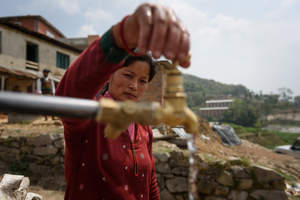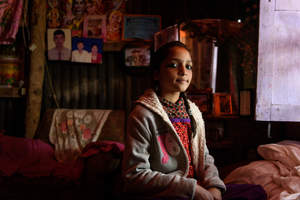NEW YORK, NY--(Marketwired - Apr 25, 2016) - As the world remembers this week the tragedy of the twin earthquakes that rocked Nepal on April 25 and May 12, 2015, the international nonprofit WaterAid marks one of the country's most untold achievements and calls for continued support to overcome water, sanitation and hygiene challenges that persist for survivors one year on.
Fast-acting and far-reaching sanitation and hygiene awareness efforts made by the Government, community health workers, volunteers and organizations like WaterAid in the weeks immediately following the earthquake resulted in the prevention of outbreaks of cholera or other dreaded diseases related to poor water, sanitation and hygiene often seen after natural and humanitarian disasters of this proportion. The fact that a secondary public health crisis was prevented is a major untold triumph.
WaterAid Nepal's Country Representative, Tripti Rai, said: "The fact Nepal avoided a cholera outbreak, and prevented widespread disease following the disaster, is a tremendous success, and one that WaterAid is glad to have helped achieve. Unfortunately, however, thousands of people across the country are still living in desperately difficult situations and in continued need of support. One year on, more aid and proficient delivery is urgently needed to ensure the rebuilding process happens as quickly as it possibly can. At WaterAid, we are especially concerned about the long-term welfare of the poorest communities."
WaterAid recognizes the government's efforts to create a strong, streamlined framework for helping the country build back better. Yet the lack of financial resources and of investment in delivery capacity in the current post-emergency phase means hundreds and thousands of people are still living in temporary housing. Many are living in cramped encampments for internally displaced persons with no long-term solutions for water or sanitation facilities. As a result, access to clean water, toilets and hygiene services is compromised -- as well as people's health, education and dignity.
Compounding the complicated situation of damage to basic infrastructure, many natural springs -- which a large number of people in rural Nepal depend upon for their water supplies -- produce less water, or have dried up all together. Some communities that once had 24/7 access to water now have just one to two hours per day, and many people are having to bath in rivers or stand in line for hours at taps.
To combat this, WaterAid, together with its local partners and the communities it works with, is working to find new spring sources and construct new intake structures for water supply schemes.
"This will be a long journey. WaterAid is committed to helping the people of Nepal build back better. Access to safe water, improved sanitation and hygiene helps build resilient communities," said Rai.
"In places including Kharelthok, WaterAid and its local partners have constructed new intakes to increase the flow of water into a water supply scheme, and communities are receiving training on how to protect and maintain fresh water springs. To date, we have helped communities restore nearly 400 water points, constructed over 300 handwashing stations, and restored toilets in public school, camps for internally displaced persons and local villages."
WaterAid had been active in Nepal for over 30 years and has a long history of water, sanitation and hygiene related successes with communities. Immediately after the emergency the WaterAid Nepal team, strengthened with staff from the wider WaterAid family, joined the international relief effort by delivering water purification drops and tablets, sanitary towels, diapers, bars of soaps, buckets, jugs of latrine disinfectant and other essential items to those affected reaching over 160,000 people.
Notes to Editors:
- Download related images here.
- Additional stories and a photo gallery entitled 'The things they carry' is also available, depicting the precious possession's recovered from destroyed homes that give survivors strength today.
About WaterAid
WaterAid is the #1 ranked international non-profit dedicated to helping the people living in the world's poorest communities gain access to safe water, toilets and hygiene. WaterAid has programs and influence in 37 countries across Africa, Asia, the Caribbean, Latin America and the Pacific region. Since 1981, WaterAid has reached 23 million people with safe water and, since 2004, 21 million people with toilets and sanitation.
Connect with WaterAid at Facebook.com/WaterAidAmerica and @WaterAidAmerica, or find out more at Wateraid.org.
- Over 600 children in Nepal under the age of five every year from diseases caused by dirty water and poor sanitation
- 2.3 million people in Nepal live without access to safe water
- Over 15 million people in Nepal don't have access to adequate sanitation. That's over half the population
- For every $1 invested in water and sanitation, an average of $4 is returned in increased productivity
- Just $25 can enable one person to access a lasting supply of safe water
Contact Information:
Alanna Imbach
Media Relations Manager
AlannaImbach@wateraid.org
+1 (212) 683-0430
+1 (917) 209-8823

